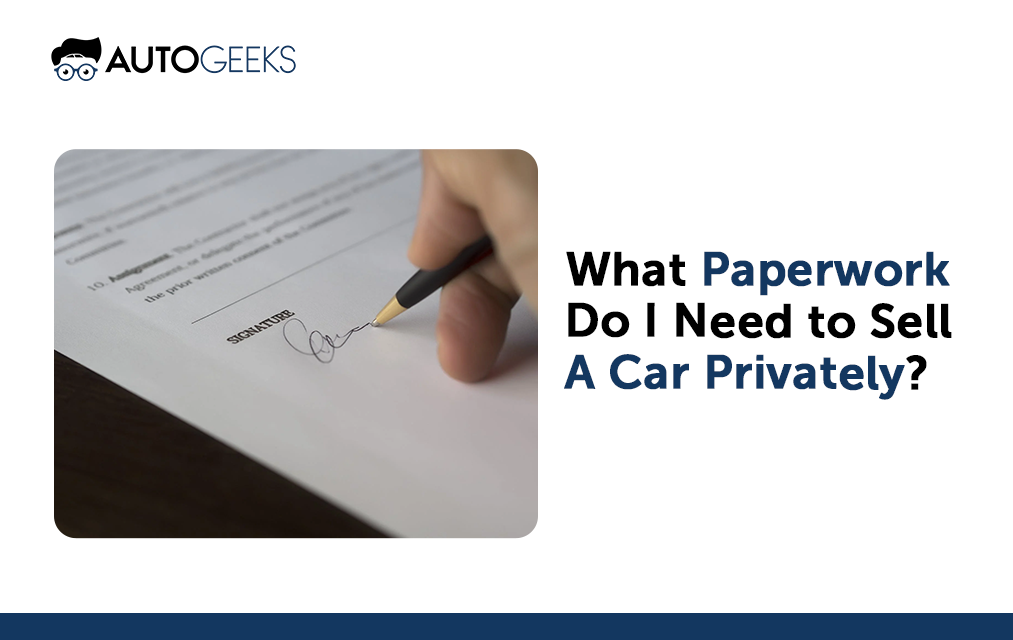 Selling a car privately can be a great way to get a good price for your vehicle. But it is essential to know the paperwork required to complete the sale. If you want to sell your car privately, you’ll need to gather some necessary paperwork to validate your car’s authenticity and instill confidence in the potential buyer. Failure to provide these documents may lead to issues during negotiation or in the future.
Most people want to sell a car privately to get a financial advantage and skip the entire process of haggling over prices. This article will look at the vital paperwork you need when selling a car privately.
Auto Geeks has made it easier to sell your cars privately and for the best price. From inspection of the vehicle to instant payment, which you can make using cryptocurrency, you can now sell your car when you have all the necessary paperwork.
Selling a car privately can be a great way to get a good price for your vehicle. But it is essential to know the paperwork required to complete the sale. If you want to sell your car privately, you’ll need to gather some necessary paperwork to validate your car’s authenticity and instill confidence in the potential buyer. Failure to provide these documents may lead to issues during negotiation or in the future.
Most people want to sell a car privately to get a financial advantage and skip the entire process of haggling over prices. This article will look at the vital paperwork you need when selling a car privately.
Auto Geeks has made it easier to sell your cars privately and for the best price. From inspection of the vehicle to instant payment, which you can make using cryptocurrency, you can now sell your car when you have all the necessary paperwork.
Title
A lienholder, such as a finance company or bank, typically holds the vehicle ownership when you sell a car that is financed or leased. This means the lienholder has a legal claim on the vehicle until the loan or lease has been fully paid off. To sell a financed or leased car, you will need to obtain the title from the lienholder by paying off the outstanding balance on the loan or lease and obtaining a lien release from the lienholder.
In contrast, if you sell a car you own outright, the title will be in your name. In this case, you will need to transfer the title to the buyer by signing it over to them and providing them with a bill of sale. This serves as proof of the sale and transfer of ownership.
It is essential to ensure that the buyer receives the title correctly and that you complete all the necessary paperwork. This will help you avoid any potential legal issues or disputes that may arise in the future.
The title also contains the manufactured color of the vehicle and technical information about the car, such as gross vehicle weight and purchase price when new.
Car Value By VIN
One way to create value when selling a car privately is to provide potential buyers with the Vehicle Identification Number (VIN). A VIN is a 17-character code uniquely identifying each car and providing access to its vehicle history report.
Providing the VIN to potential buyers allows them to easily access information about the car’s history, including any past accidents, ownership changes, and outstanding recalls or issues. This information can be valuable to buyers as it helps them make an informed decision about the car’s condition and potential risks. It’s also easy to find.
Including the VIN and other relevant documentation when selling a car privately can be a powerful way to create value. And it can help make the process of selling the car smoother and faster.
Vehicle History Report
 A vehicle history report provides a detailed record of the car’s history, including information about past accidents, owners, repair history, and any outstanding recalls or issues.
A few companies provide vehicle history reports, and you can usually obtain one by entering the car’s vehicle identification number (VIN).
Providing a vehicle history report to potential buyers can be beneficial for a few reasons, such as:
A vehicle history report provides a detailed record of the car’s history, including information about past accidents, owners, repair history, and any outstanding recalls or issues.
A few companies provide vehicle history reports, and you can usually obtain one by entering the car’s vehicle identification number (VIN).
Providing a vehicle history report to potential buyers can be beneficial for a few reasons, such as:
- It can help increase their confidence in the car’s condition and history. If the report shows that the vehicle has been well maintained and has a clean record, it can be a selling point.
- It’ll give the potential buyer insight concerning the car’s reliability.
As such, a vehicle history report can also make selling the car faster. By providing this information upfront, you can save time with buyers who may not be interested in a vehicle with a less-than-stellar history.
Maintenance Records
Maintenance records can be an essential piece of documentation to provide when selling a car privately. These records provide details of any maintenance or repairs done on the vehicle. They can help potential buyers understand the car’s condition, including any issues that need to be addressed.
A few different types of maintenance records may be relevant when selling a car. For example, you may have records of oil changes, tire rotations, and other routine maintenance that has been done. You may also have records of major repairs or replacements, such as a new transmission or engine.
Providing maintenance records to potential buyers can be beneficial for a few reasons. First, it can help demonstrate the car’s value by showing that it has been well-maintained. This can be especially important for vehicles with higher mileage, as it can help buyers feel more confident in the car’s condition.
Maintenance records showcase the vehicle’s value and inform potential buyers of any necessary repairs or issues. For example, suppose the records show that the car has had several major repairs in a short time. In that case, it may be a red flag for buyers and could lower the car’s value.
Odometer Disclosure

An odometer disclosure statement, also referred to as a mileage statement, documents the current mileage of a vehicle during a sale or transfer and is legally necessary for changing ownership. This document protects both buyer and seller by accurately disclosing the vehicle’s mileage.
If you are selling a car privately, you must provide the buyer with an odometer disclosure statement as part of the required paperwork. This statement should include the following information:
- The make, model, and year of the vehicle
- The vehicle identification number (VIN)
- The current mileage of the vehicle
- The date the statement is being completed
- Your signature, as the seller, attesting to the accuracy of the information provided
Warranty Documentation
If you are selling a car privately, you must provide the buyer with any documentation related to the vehicle’s warranty. The warranty documentation should consist of the original warranty document and records of any warranty repairs or maintenance performed on the vehicle.
Warranty documentation should outline the warranty terms, including the coverage duration, covered repairs and maintenance, and any exclusions or limitations.ms, including the duration of the coverage, the types of repairs and maintenance that are covered, and any exclusions or limitations. It is crucial to provide this information to the buyer, so they are aware of any protection they may have if something goes wrong with the vehicle after the sale.
The manufacturer’s warranty still covers the car, allowing the transfer of the remaining insurance to the new owner, adding value and reassurance to the deal. The manufacturer warranty, linked to the vehicle’s VIN, automatically transfers to the new owner, but transferring a third-party extended warranty requires additional steps and may incur a fee.
To transfer your warranty when selling your car, gather all your warranty information, including the contact details of the warranty company, and inquire about the transfer process when you’re ready.
Bill of Sale – Documentation of the Vehicle as-it-is
When selling a car privately, you may want to provide the buyer with documentation of the vehicle as it is at the time of the sale. Although not legally required, it ensures you release liability, and the potential buyer takes responsibility for the car’s as-it-is condition. It also establishes the date of sale.
It’s also a good idea to include the following documents:
- A description of the vehicle’s current condition, detailing any known issues or problems.
- A list of any additional features or modifications made to the vehicle.
- Photos of the interior and exterior of the vehicle showing any damage or wear and tear.
Providing this documentation is optional, but it can help ensure that both parties clearly understand the vehicle’s condition at the time of the sale. It can also be a reference point if any disputes or issues arise after the sale.
Emissions Documentation
Besides providing the VIN, other documentation, such as a smog check certificate, can also be helpful if required. You may need to provide a smog check if you live in a US state that requires it.
For instance, California DMV requires strict compliance with emission standards. Before selling your car, check with your local DMV to see the standards for smog or emissions testing and smog certification.
All this information can help demonstrate the car’s value and increase confidence in its condition.
Proof of Sale
 Depending on where you live, the paperwork may not end even after you’ve sold your car!
Following the successful sale of your vehicle, you may be required to sign one additional piece of paperwork to release all liability. Some states will require you to notify the DMV of the vehicle sale within a certain number of days.
Sellers in California, for example, have five days to file a Notice of Transfer and Release of Liability form, which is available on the DMV’s website; sellers in Illinois should complete a Notice of Transaction form as soon as the car sale is final. You should check with your state’s DMV for any paperwork obligations that may arise following the sale.
Depending on where you live, the paperwork may not end even after you’ve sold your car!
Following the successful sale of your vehicle, you may be required to sign one additional piece of paperwork to release all liability. Some states will require you to notify the DMV of the vehicle sale within a certain number of days.
Sellers in California, for example, have five days to file a Notice of Transfer and Release of Liability form, which is available on the DMV’s website; sellers in Illinois should complete a Notice of Transaction form as soon as the car sale is final. You should check with your state’s DMV for any paperwork obligations that may arise following the sale.
Final Words
Selling a car privately can be a great way to secure a favorable price for your vehicle. Still, it is essential to have all the necessary paperwork to avoid any legal complications in the future.
Whether you are selling a financed or leased car, or one you own outright, it is essential to obtain the title from the lienholder (if applicable), transfer the title to the buyer, and provide a bill of sale as proof of the sale and transfer of ownership. You can ensure a smooth and successful private car sale by providing these details.
However, providing all the documents could be overwhelming for most people. If you want to sell your car privately and you don’t have one or all of the above paperwork, Auto Geeks can smoothen the process by helping you get the required paperwork ready.
With Auto Geeks, you can sell your car privately from the comfort of your home. After sending the necessary paperwork and car pictures, you will get an instant offer within three business hours! Learn how it works now.
 Selling a car privately can be a great way to get a good price for your vehicle. But it is essential to know the paperwork required to complete the sale. If you want to sell your car privately, you’ll need to gather some necessary paperwork to validate your car’s authenticity and instill confidence in the potential buyer. Failure to provide these documents may lead to issues during negotiation or in the future.
Most people want to sell a car privately to get a financial advantage and skip the entire process of haggling over prices. This article will look at the vital paperwork you need when selling a car privately.
Auto Geeks has made it easier to sell your cars privately and for the best price. From inspection of the vehicle to instant payment, which you can make using cryptocurrency, you can now sell your car when you have all the necessary paperwork.
Selling a car privately can be a great way to get a good price for your vehicle. But it is essential to know the paperwork required to complete the sale. If you want to sell your car privately, you’ll need to gather some necessary paperwork to validate your car’s authenticity and instill confidence in the potential buyer. Failure to provide these documents may lead to issues during negotiation or in the future.
Most people want to sell a car privately to get a financial advantage and skip the entire process of haggling over prices. This article will look at the vital paperwork you need when selling a car privately.
Auto Geeks has made it easier to sell your cars privately and for the best price. From inspection of the vehicle to instant payment, which you can make using cryptocurrency, you can now sell your car when you have all the necessary paperwork.
 A vehicle history report provides a detailed record of the car’s history, including information about past accidents, owners, repair history, and any outstanding recalls or issues.
A few companies provide vehicle history reports, and you can usually obtain one by entering the car’s vehicle identification number (VIN).
Providing a vehicle history report to potential buyers can be beneficial for a few reasons, such as:
A vehicle history report provides a detailed record of the car’s history, including information about past accidents, owners, repair history, and any outstanding recalls or issues.
A few companies provide vehicle history reports, and you can usually obtain one by entering the car’s vehicle identification number (VIN).
Providing a vehicle history report to potential buyers can be beneficial for a few reasons, such as:
 An odometer disclosure statement, also referred to as a mileage statement, documents the current mileage of a vehicle during a sale or transfer and is legally necessary for changing ownership. This document protects both buyer and seller by accurately disclosing the vehicle’s mileage.
If you are selling a car privately, you must provide the buyer with an odometer disclosure statement as part of the required paperwork. This statement should include the following information:
An odometer disclosure statement, also referred to as a mileage statement, documents the current mileage of a vehicle during a sale or transfer and is legally necessary for changing ownership. This document protects both buyer and seller by accurately disclosing the vehicle’s mileage.
If you are selling a car privately, you must provide the buyer with an odometer disclosure statement as part of the required paperwork. This statement should include the following information:
 Depending on where you live, the paperwork may not end even after you’ve sold your car!
Following the successful sale of your vehicle, you may be required to sign one additional piece of paperwork to release all liability. Some states will require you to notify the DMV of the vehicle sale within a certain number of days.
Sellers in California, for example, have five days to file a Notice of Transfer and Release of Liability form, which is available on the DMV’s website; sellers in Illinois should complete a Notice of Transaction form as soon as the car sale is final. You should check with your state’s DMV for any paperwork obligations that may arise following the sale.
Depending on where you live, the paperwork may not end even after you’ve sold your car!
Following the successful sale of your vehicle, you may be required to sign one additional piece of paperwork to release all liability. Some states will require you to notify the DMV of the vehicle sale within a certain number of days.
Sellers in California, for example, have five days to file a Notice of Transfer and Release of Liability form, which is available on the DMV’s website; sellers in Illinois should complete a Notice of Transaction form as soon as the car sale is final. You should check with your state’s DMV for any paperwork obligations that may arise following the sale.
